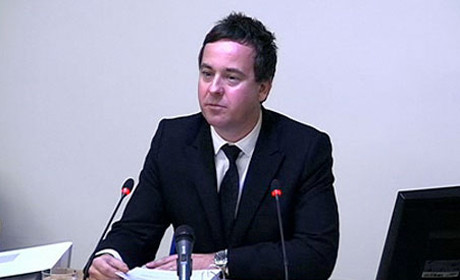
Sun editor Dominic Mohan giving evidence to the Leveson inquiry
Dominic Mohan, the editor of the Sun, told the Leveson inquiry today that he was "well aware" of phone hacking in 2002 but was joking when he publicly accused the Mirror of using the practice that year.
Speaking at the Princess Margaret Awards – known in the industry as the 'Shaftas' – Mohan thanked "Vodafone's lack of security" for the Mirror's showbusiness coverage.
Mohan admitted that he was referring to phone hacking – which he said was "widely known about" at the time – but told the inquiry that the comment about the Mirror was "purely a joke" designed to "undermine their journalism because they'd had a particularly good year".
The editor of the Mirror at the time was Piers Morgan, who vigorously denied any knowledge of phone hacking during his own testimony to the inquiry in December.
Former Mirror writer James Hipwell, who was sacked from the paper and jailed for share-tipping, later told the inquiry that hacking was a "bog-standard" technique at the Mirror during Morgan's editorship.
In a fairly brief testimony during which Mohan was rarely put under pressure by the inquiry counsel, Robert Jay QC, the Sun editor claimed that the tabloid did not use private detectives, only "search agents".
There is a distinction between the two, Mohan said, calling search agents "legitimate" and implying that they obtained information for the paper without breaking the law.
He also mounted a staunch defence of the Sun, telling the inquiry it could be "real force for good" and listing examples of its work in employment, education, and charity.
He went on to tell the inquiry that he was considering reappointing a readers' ombudsman to deal with complaints. The previous ombudsman was not replaced after his death, Mohan said, because there were not enough complaints to justify the position.
But he told the inquiry today that reappointing one "could be useful for internal self-regulation … rather than having to go to the PCC".
Asked for his opinion on the PCC and the future of press regulation, Mohan said that an adjudication from the regulatory body was "met with great shame" by editors but the Commission needed to be "toughened up" nonetheless.
He also called for a "level playing field" in regulating the press and the internet, warning that failing to regulate the internet properly could be a "mortal blow" for the press.
Mohan cited the example of restrictions in naming footballer Ryan Giggs as the man behind an anonymous injunction, and how his "heart sank" when he was finally allowed to publish the name but there were "already several million people out there who knew" the name because social networks "weren't subject to the restrictions we'd been under".
Also appearing on behalf of the Sun today was former editor Kelvin MacKenzie, who said his former employer News International should face a "heavy fine" for allegedly lying to the PCC over phone hacking.
Justin Walford, a lawyer for the Sun, denied seeing any evidence of hacking at the tabloid, despite speculation, and said staff received "a great deal more" legal training now than they had previously.
Free daily newsletter
If you like our news and feature articles, you can sign up to receive our free daily (Mon-Fri) email newsletter (mobile friendly).











